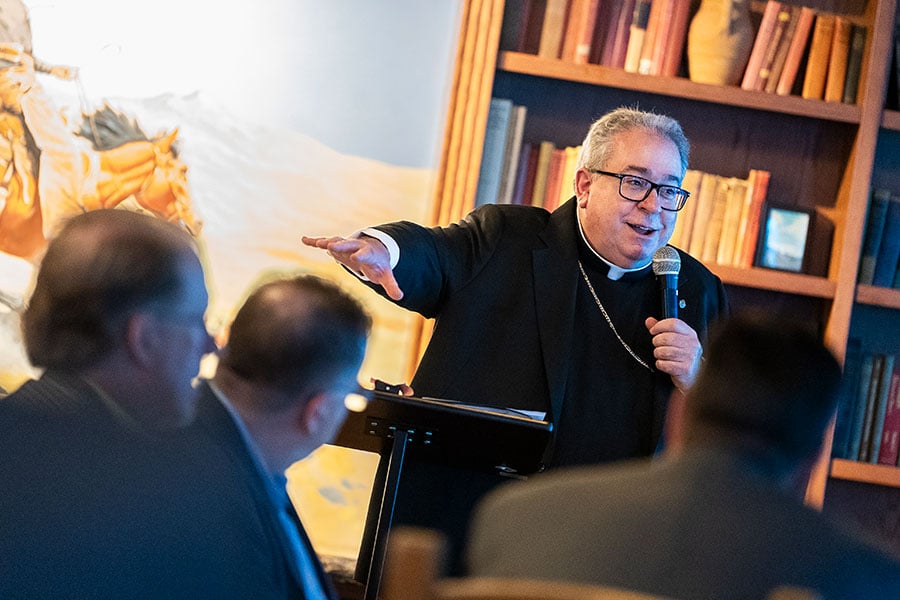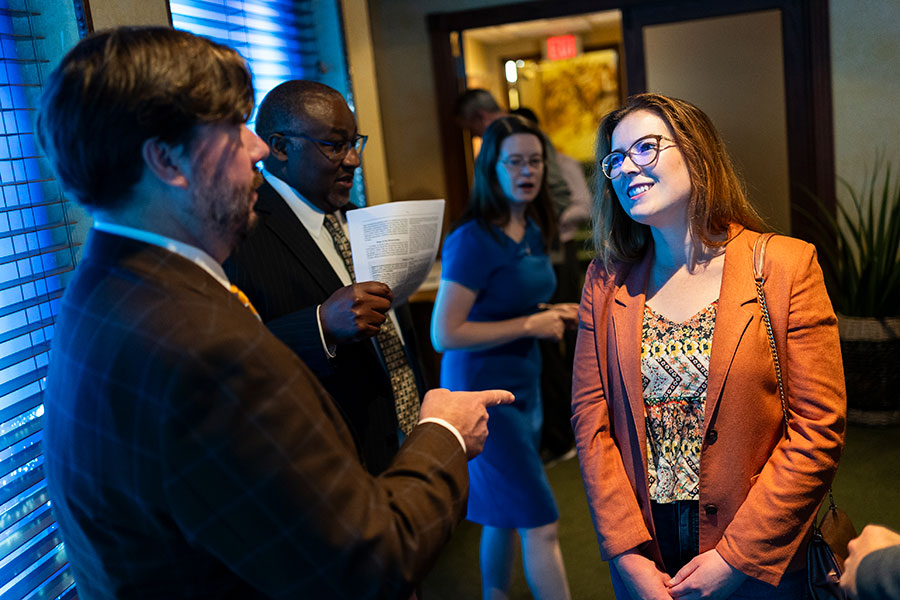Bishop Olson discusses end-of-life decision making with St. Thomas More Society Fort Worth

Bishop Michael Olson presents on end-of-life issues during a talk for the St. Thomas More Society Fort Worth on October 12, 2023 at Reata Restaurant. (NTC/Juan Guajardo)
FORT WORTH — Advance directives, disproportionate vs. proportionate treatment, do not resuscitate orders — end-of-life medical decision making is often complicated and nebulous for patients, their families, and caregivers. When those arrangements are contested, the legal system adds to the complexity.
Bishop Michael Olson spoke to attorneys and guests of the St. Thomas More Society Fort Worth about the ethical and moral considerations of end-of-life medical decision making, especially in light of the overhaul of the Texas Advance Directives Act, which passed the Texas House and Senate unanimously and was enacted on Sept. 1, 2023.
Using examples from the Gospels, major court cases, and centuries-old teachings from theologians, Bishop Olson shared some Catholic guidelines to assist in balancing the dignity and value of human life with the inevitability of death.
The topic has been well-considered by the bishop, who earned a doctorate in moral theology with a concentration in bioethics at the Accademia Alphonsiana in Rome; worked as an ethicist in a hospital; testified many times before the Texas legislature on advance directives and end-of-life care; and serves as chair of the United States Conference of Catholic Bishops subcommittee on health care issues.
The bishop began by reminding the audience that death is not the ultimate enemy. “In God’s plan of salvation given to us through His Son, death is conquered and transformed, not just simply eradicated,” he said, recalling that even those whom Jesus healed eventually died, “except Lazarus, who died twice.”
Instead, death is a transition to eternal life.
It follows, then, that life, albeit a cherished gift from God, is not the greatest good. Bishop Olson stated, “The greatest good is our love of God and neighbor…that’s the moral point by which we can assess every action in our life.
“God is the sole master of life and death, and the right to directly take life belongs to Him alone. Human beings are stewards of God's gift of life and may never directly take human life,” he emphasized.

With that framework in mind, Bishop Olson encouraged Catholics to create advance directives, which may have marginal utility as a legal document but serve the primary purpose of starting a conversation between a person and his family or caregiver about his preference for future medical care. He emphasized that decision-making should be made by the patient, his family, and the medical staff, not the courts.
He also made the distinction between ordinary, or proportionate, means of prolonging life and extraordinary or disproportionate means of treatment, which may be burdensome care to some critically sick patients and is not required, according to the teachings of the Catholic Church. The bishop added that the proportionality of particular medical treatments is not absolute but must be assessed according to the particular circumstances of each patient.
Bishop Olson also gave an overview of five major court cases concerning end-of-life issues that have shaped current law, and he explained the key components of the Advance Directives Act that were reformed this year to provide better communication and increased transparency between patients and healthcare providers.
Among the audience were two palliative care physicians from Cook Children’s Medical Center, Mustafa Caylan, MD, and Jason Reynolds, MD, whose work helps reduce the physical, emotional, social, and spiritual suffering of children with serious illnesses.
A parishioner at St. Andrew Church in Fort Worth, Dr. Reynolds said that navigating the moral and ethical issues of seriously ill children, especially in a secular health care system, is challenging due to the complexity of the child’s medical condition; diverse opinions from medical professionals on the proportionality of a particular treatment; and the inability of many of the patients to give input into their care.
He said, “I look at the healthcare industry, and I see often the potential for patients and parents' voices to be overwhelmed by the technologies that are available. While I'm not in this space to try to affect any one particular outcome, I'm in this space to make sure that patients and families are aware of what their options are both for treatment and to refuse or choose not to receive certain treatments. I don't want patients and families to be exposed to or suffer disproportionate burdens if it's not consistent with their goals.”
Dr. Caylan added that the medical culture has difficulty “even seeing death as a part of nature, a part of life. The medical system acts as if death shouldn't happen. But then it is the single most inescapable reality of life.”
For an hour on October 12, the reality and repercussions of the end of life were addressed through the primary lens of loving God and loving neighbor.
This discussion was one of a series of lunchtime events hosted by the St. Thomas More Society Fort Worth, a professional organization for Catholic lawyers that offers regular educational lectures, Masses and Holy Hours, conferences, and social gatherings.
